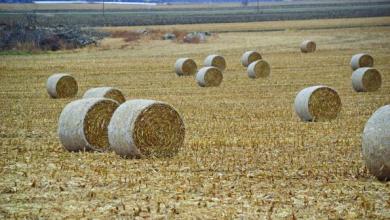
Choose a net wrap that meets your needs, then make the necessary baler adjustments and stick with the same product, or at least the same manufacturer.
That's the best route to dependable performance from round-bale net wrap, says David Hart, a technician at Cordex Agri, a Portuguese company that sells net wrap in the U.S. through Cordex North America.
"Each net from each manufacturer will be slightly different," says Hart. "It doesn't mean theirs is better and someone else's is worse or vice versa. It just means it's different."
Identifying which manufacturers make which net wraps isn't easy, however. Some make multiple brands, and distributors often put their own labels on products from multiple suppliers. Even hay-equipment companies that sell net wrap sometimes buy from more than one source, says Hart.
"So it becomes very confusing to work out who the original manufacturer is."
Hart estimates that about half of the net wrap sold in the U.S. is made here; the rest is imported from China, Germany, Italy, Portugal and countries in the Middle and Far East. It comes in three strengths: standard construction, reinforced and fully reinforced. Packages typically don't say which type is inside, but dealers should have that information.
Roll weight is another quality indicator, adds Cy Eisele, a Reading, MN, hay grower and net-wrap dealer. For example, he sells 8,000' x 67" rolls that weigh 104 lbs each and says some products weigh less or come in longer rolls that don't weigh as much.
The needed quality depends on the bale size, type of forage and number of times the bales will be handled. Standard-construction net wrap should suffice for 4 x 4' bales of grass hay that will be fed on the farms where they're made. If the bales will be sold and handled several times, reinforced net or an extra layer may be needed, says Hart.
Cornstalk bales need fully reinforced net, and so does wheat straw, says Eisele. Today's rotary combines leave shorter straw, and newer balers pack more of it into each bale, he says. For most uses, he recommends two net-wrap layers for hay bales and three for cornstalks.
Eisele used to buy different brands of net wrap from his feed supplier, but wasn't satisfied with the quality. He tried Pritchett net wrap and eventually began selling it. Growers and custom balers should shop for the best deal because high-quality nets are available in a wide range of prices, he advises.
Hart suggests buying known brands from dealers who provide satisfactory service and backup support. If a dealer sells his own brand, check to make sure he buys from the same manufacturer every year.
"What the end user needs is consistency," he adds. "He can spend the time to set his machine and know he's going to get consistent, good bales."
Equipment dealers encourage customers to use their companies' net wrap in the balers they sell. But Eisele says any reasonable-quality net wrap will perform well in any baler if the machine is properly adjusted.





